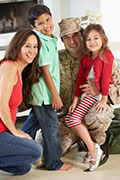- 10 Strategies to Overcome Insomnia
- Could Artificial Sweeteners Be Aging the Brain Faster?
- Techniques for Soothing Your Nervous System
- Does the Water in Your House Smell Funny? Here’s Why
- Can a Daily Dose of Apple Cider Vinegar Actually Aid Weight Loss?
- 6 Health Beverages That Can Actually Spike Your Blood Sugar
- Treatment Options for Social Anxiety Disorder
- Understanding the Connection Between Anxiety and Depression
- How Daily Prunes Can Influence Cholesterol and Inflammation
- When to Take B12 for Better Absorption and Energy
Kids’ Risky Behaviors a Concern in Some Military Families


Children in U.S. military families are more likely to engage in risky behaviors and to be bullied than those in civilian families, a new study finds.
Researchers surveyed about 688,000 middle and high school students in California in 2013, including more than 54,000 who lived in a military family.
Compared to those in civilian families, children in military families were more likely to report alcohol use (45 percent vs. 39 percent); physical bullying such as being punched, kicked, or slapped (36 percent vs. 27 percent); and non-physical bullying such as being the target of jokes, rumors or online harassment (66 percent vs. 59 percent).
The study, published Aug. 17 in the journal JAMA Pediatrics, also found that kids in military families were more likely to take a gun or knife to school. Fights and fear of being beaten up were more common among military-related children as well.
“These results suggest that a sizable subset of military-connected students are struggling to cope with the ramifications of two long wars,” lead author Kathrine Sullivan, a Ph.D. student in social work at the University of Southern California, said in a university news release.
“While a lot of military kids are still doing well, despite these stressors, many are in need of more support,” she added.
Nationwide, an estimated 4 million students have had parents serve since the start of the wars in Iraq and Afghanistan, and many of those youngsters are currently enrolled in public schools, according to the researchers.
“The findings suggest that health risk and behavior issues among military-connected students should not be viewed in isolation,” study co-author Tamika Gilreath, an assistant professor in the USC School of Social Work, said in the news release.
“It is likely that youth who experience difficulty with substance use are the same youth who might have problems with victimization,” she added.
Schools need to know who their veteran- and military-connected students are, and should assess their needs and provide supports, study co-author Gordon Capp, a Ph.D. student in social work at USC, said in the news release.
More information
The American Academy of Child & Adolescent Psychiatry has more about families in the military.
Source: HealthDay
Copyright © 2026 HealthDay. All rights reserved.










